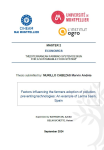Murillo Cabezas M.A. (2024).
Factors influencing the farmers adoption of pollution-preventing technologies: an example of Lerma basin, Spain. Mémoire (Master 2 MIDAS) : CIHEAM-IAMM, Montpellier (France). 83 p. Master 2 Thesis. Economics. Programme: Mediterranean farming system design for a sustainable food-system [MIDAS]. Co-accreditation University of Montpellier, Institut Agro Montpellier, CIHEAM-IAMM.
| Titre : | Factors influencing the farmers adoption of pollution-preventing technologies: an example of Lerma basin, Spain |
| Auteurs : | M.A. Murillo Cabezas |
| Type de document : | Thèse, Mémoire, Master |
| Année de publication : | 2024 |
| Format : | 83 p. |
| Note générale : | Master 2 Thesis. Economics. Programme: Mediterranean farming system design for a sustainable food-system [MIDAS]. Co-accreditation University of Montpellier, Institut Agro Montpellier, CIHEAM-IAMM. |
| Langues : | Anglais |
| Langues du résumé : | Anglais ; Français |
| Catégories : |
Catégories principales 06 - AGRICULTURE. FORÊTS. PÊCHES ; 6.4 - Production Agricole. Système de ProductionThésaurus IAMM SYSTEME DE PRODUCTION ; PRATIQUE AGRICOLE ; DURABILITE ; COMPORTEMENT DES AGRICULTEURS ; LIBAN |
| Résumé : | The Mediterranean is under numerous pressures, including climate change, recurrent drought, and complex geopolitical and economic crises. In the Ebro River basin in the Aragon region of Spain, such adversities have major impacts on its agricultural systems. Persistent drought in arid agricultural areas of the region results in decreased productivity and a diminishing water budget for irrigation, which necessitates regulatory measures such as irrigation quotas and strict watering schedules, as well as increasing amounts of discards. Moreover, the uncontrolled use of chemical inputs—primarily fertilizers and pesticides—has increased pollution in soils and water bodies. The main objective of this study is to improve the socioeconomic resilience of agricultural systems through specific management practices and to avoid the contamination of water resources in the Aragon region of Spain, specifically in the Lerma basin. To address the above-mentioned objective, the research utilizes a multi-method approach that entails an in-depth review of multidisciplinary information related to the topics, field patrols, intensive data collection, and advanced data analysis technologies. The Geographic Information System, socioeconomic statistics and stakeholder conversations are used to describe farm categorization and define the agricultural realities of the study region. The structured questionnaires aimed at obtaining general farming, water, chemicals, yields, and management data are being generated. Moreover, The SWOT analysis and the conceptual models are sophisticated tools that I use to evaluate the sustainability of farming units and simulate future opportunities through scenarios. The final output is the assessment of the impact of dissimilar management on economic viability and resilience, which is instrumental in influencing sustainable practices and boosting Mediterranean farming systems’ resilience. |
| Nature du diplôme : | Mémoire (Master 2 MIDAS) |
| Université de soutenance : | CIHEAM-IAMM |
| Ville de l'université de soutenance : | Montpellier (France) |
| Cote : | Réservé lecteur CIHEAM |
| Directeur de Thèse : | Belhouchette H.; Bayraktar A. |
| Membres du Jury : | Bourceret A.; Kleftodimos G.; Soler A.; Belhouchette H.; Bayraktar A. |







